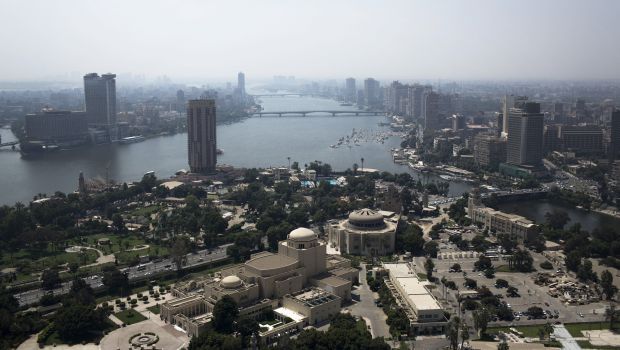
A general view of the Nile River and the Cairo skyline is seen from the Cairo Tower in the Zamalek district on August 27, 2013. (AP Photo/Manu Brabo)
Cairo, Asharq Al-Awsat—Thousands of Egyptian textile workers demonstrated on Monday, as doctors and pharmacists called for partial strikes to demand better pay and conditions in the first major industrial action since the downfall of former President Mohamed Mursi.
The protests have broken the monopoly of political protests witnessed by the country since the Mursi was deposed, and have added to the problems of transitional authorities facing growing political, economic and security challenges.
In recent months, the government has succeeded in containing disquiet among large sections of both blue- and white-collar workers by talking about planned measures to achieve social justice. But the government’s failure to implement the minimum wage regulations by the start of the year has caused deep resentment among workers.
Faisal Laqoushah, a union leader at a state-owned textile factory in El-Mahalla, told reporters that around 20,000 workers had put down their tools, and confirmed that negotiations were ongoing between labor leaders, company management and the Ministry of Finance.
The textile workers were demanding the implementation of the minimum wage regulations which announced by the government at the end of last year that put the minimum wage at 180 US dollars per month, as well as the payment of their scheduled bonuses.
Workers covered by the minimum wage regulation have also complained about poor working conditions, and say the minimum wage figure suggested by the government is not proportionate to price increases.
In addition to workers in state textile factories, workers at a land reclamation company held a demonstration in front of their company’s bank in central Cairo on Monday. They subsequently tried to storm the building. The workers were demanding their unpaid wages, and for the minimum wage regulations to be implemented.
Drivers of the new “white taxis” also held a demonstration at the Finance Ministry in Nasr City, east of Cairo, and threatened to stop paying the installments on their cars, accusing the ministry of deceiving them about the cost of their new cabs.
Over the past few years the government has worked to replace old taxis, traditionally painted black and white, with new, all-white vehicles.
Around 40 percent of Egyptians are officially classed as living in poverty. Economic pressures on a wide section of society have increased since the ouster of the former President Hosni Mubarak’s regime three years ago, due in part to political unrest.
Dalia Moussa, who is in charge of labor issues at the Egyptian Center for Economic and Social Rights, told Asharq Al-Awsat that “there are no recorded statistics about the workers’ protests after June 30, but they have certainly receded,” referring to the period since Mursi was ousted.
Moussa said there are two reasons for the decline in industrial unrest. The first is the media discourse regarding the “war on terror” that has beset the country following the fall of the Brotherhood government and in response to the aspirations for the post-Brotherhood state; the second, the fear of “suppression” from the authorities.
Workers’ protests, according to political science researcher Ammar Ali Hassan, reflect the success of Egypt’s recent revolutions from a political point of view and their failure to translate this political action into social and economic progress.
Hassan told Asharq Al-Awsat : “As the country heads into the presidential race, workers are seeking to draw attention and place their demands on the table of any forthcoming president.”
He added: “I have no information about the role of the Muslim Brotherhood, but some workers who are affiliated with the Left talk about that, too. In general, the Brotherhood did not have a role among the ranks of the workers, however, they tried in the past three years to infiltrate the workers’ movement, and this may come into fruition now.”
Moussa pointed to the almost total absence of political parties from workers’ strikes. She said: “Workers deal very carefully with the political parties, but they are more open towards human rights organizations and political movements. What is certain is that the workers will announce a strike automatically when all other avenues for a solution with their managers have been exhausted.”
Moussa said that among hundreds of workers’ protests, only a small number succeeded in achieving gains. She added that the level of participation in the protests did not affect workers’ ability to negotiate.
Since Mursi’s ouster, Brotherhood supporters have been demonstrating almost daily. These demonstrations have frequently led to clashes with the security forces and political opponents, which have left hundreds dead amid a state of stark political polarization. However, the growing number of industrial disputes may alter the political scene and lead to more mass demonstrations in the country, according to observers.
